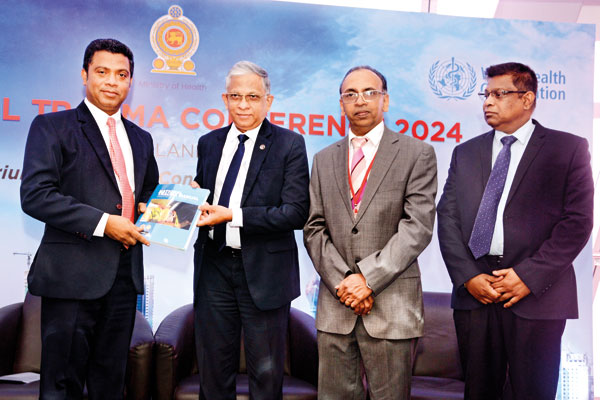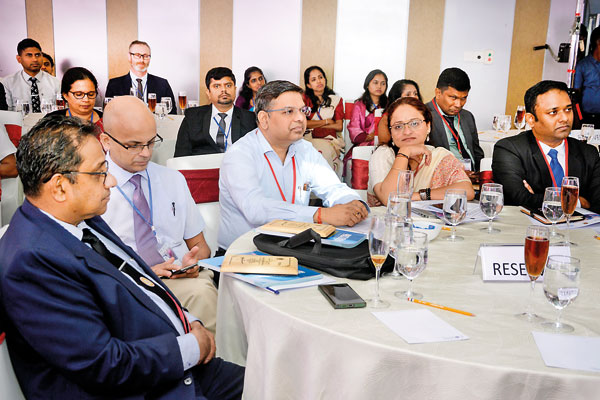News
Critical trauma conference to share knowledge on how to prevent death and severe disability
View(s):By Kumudini Hettiarachchi
As a deep depression in the Bay of Bengal battered Sri Lanka with gale-force winds and heavy showers, bringing about several deaths and injuries to numerous people, it was all aspects of trauma that came under extensive discussion at the National Trauma Conference 2024.
The three-day conference from November 28-30, organised by the Trauma Secretariat of the Health Ministry in collaboration with the World Health Organization (WHO) on the theme ‘Trauma to Triumph: Building Connections and Collaborations’ at the Lotus Tower in Colombo, saw a large number of international and local participants including experts.
Established in September 2006, the Trauma Secretariat is mandated to oversee all aspects of trauma system development. It has as its mission the setting up of a contemporary trauma care system to prevent preventable deaths due to trauma and reduce the severity of disability for those who survive.

Dr Asela Gunawardena presents the National Trauma Manual to Minister Dr Nalinda Jayatissa, as Dr Kirthi Abayajeewa and Dr Indika Jagoda look on. Pix by Priyanka Samaraweera
The Trauma Conference being the first he was attending after being appointed as Health Minister, Dr. Nalinda Jayatissa who was the Chief Guest smilingly told the inauguration on Thursday morning that he not only had the responsibility of facilitating trauma management through his ministry but also keeping the faith of the people and protecting the image of the government from political trauma.
Reiterating that the conference marked a “significant” milestone in the collective journey to address one of the most pressing challenges faced by modern healthcare systems, he pointed out that trauma remains one of the leading causes of death and disability worldwide, particularly in developing countries like Sri Lanka.
“With our increasing population, urbanization and rapid development, the burden of trauma-related injuries continues to grow. From road traffic accidents to workplace injuries, natural disasters and other emergencies, our healthcare system is constantly called upon to provide timely and effective care under challenging circumstances,” he said.

The delegates at the conference
Dr. Jayatissa said that as a government, they are aware of the critical role trauma care plays in saving lives and have prioritized investments in: Strengthening Emergency Medical Services (EMS); upgrading Trauma Centres; training and capacity building; and research and technology integration.
“However, we cannot achieve these goals alone. Collaboration is the cornerstone of progress, and I urge everyone gathered here – healthcare professionals, academics, industry partners and government representatives – to work together towards our shared vision of a safer and healthier Sri Lanka,” he said.
The Minister added: “Let us remember that the work we do here today will ripple far beyond this hall. It will impact countless lives – those of the injured, their families and future generations who will benefit from a stronger, more resilient healthcare system. The critical issues of trauma are not just technical challenges but human ones. Addressing them will require empathy, innovation and unwavering commitment.”
The Director-General (DG) of Health Services and Chair/National Trauma Secretariat, Dr. Asela Gunawardena stressed that the conference was more than an academic event. “It is a platform for collaboration where healthcare professionals, researchers, policymakers and advocates come together with a common purpose – to improve the lives of those affected by trauma.”
Whether physical injury, psychological wounds or the long-term effects of trauma on individuals and communities, we know the “burden is great”, but so is “our collective responsibility”, he said.
The conference theme “resonates deeply”, said Dr. Gunawardena, “as we acknowledge the complexity of trauma care in all its forms. We are not just concerned with the immediate emergency response but also long-term rehabilitation, psychological support and the creation of systems that ensure every survivor has access to the best possible care”.
Underscoring that in Sri Lanka as in many parts of the world, trauma both accidental and intentional, is a “major” public health challenge, chilling statistics came from him.
· Trauma is the “leading” cause of hospitalization in Sri Lanka.
· Trauma is the 8th leading cause of death in Sri Lanka.
“Natural disasters, road traffic accidents, violence and medical conditions contribute to a rising burden on our healthcare system. It is in such challenging times that we see the resilience of individuals, families and communities and the critical role of trauma professionals in supporting them. That was the intention of establishing the Trauma Secretariat and organizing these types of conferences,” he said.
The DG urged that while learning from experts, these conferences were also about learning from each other, be it a trauma surgeon, emergency responder, psychiatrist, nurse or researcher.
Cautioning that health systems around the world are under pressure and resources can be limited, he said that by working together, pooling expertise and experiences, solutions can be found to overcome these barriers.
“This will ensure that trauma care continues to evolve in ways that are accessible, effective and compassionate,” Dr. Gunawardena added.
The international experts at the conference included Prof. Sergei Kirov from Russia who made a crystal clear presentation on the intricacies of war surgery and those from Australia, Canada, the All India Institute of Medical Sciences, Delhi, Japan, Korea, Philippines, Qatar, Singapore and Thailand.
| A Guide on primary trauma care The National Trauma Manual – A Guide to the Management of Trauma in Sri Lanka was launched during the inauguration. | |
The best way to say that you found the home of your dreams is by finding it on Hitad.lk. We have listings for apartments for sale or rent in Sri Lanka, no matter what locale you're looking for! Whether you live in Colombo, Galle, Kandy, Matara, Jaffna and more - we've got them all!

